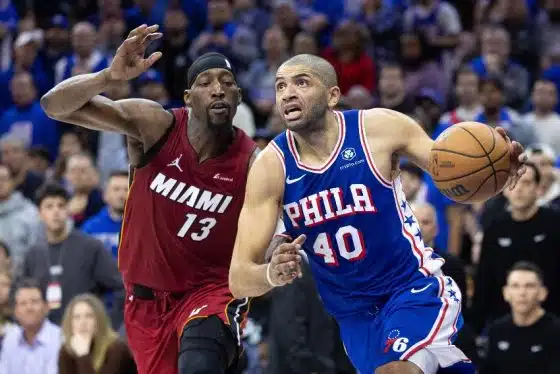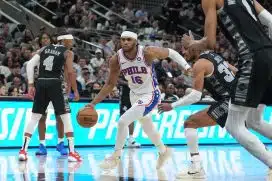By Scott Cashin, Sports Talk Philly Staff
Did Philadelphia 76ers general manager Elton Brand intentionally incur a significant future tax bill to pave the way for Shake Milton to find a long-term role?
As details emerged today surrounding the structure of the Al Horford contract, it became clear that the organization left themselves an almost unusable portion of space under the salary cap. The $2,272,194 remaining after signing Horford isn’t enough on its own to do much more than sign a player up to seven years of experience to slightly more than a minimum-level contract. In fact, if they gave Horford the same $109 million over four years and front loaded as much as they could, they could have saved ownership a hefty sum in the fourth year of Horford’s contract.
You might not think that $1,459,459 avoided in the last year is a significant sum of money, but when you consider the tax bracket the team could be in at that point, the numbers become more significant. If the Sixers are already $15 million over the tax threshold, that extra $1.4 million would hit ownership in the pocket to the tune of $7.6 million. At $20 million, the additional cost swells to $8.3 million and $9.1 million if the team is at the $25 million threshold.
So why would ownership incur this additional cost when it could easily be avoided?
It could have something to do with the reported Shake Milton contract. While the team could have used a minimum salary exemption to sign Milton to the roster like they will do with Kyle O’Quinn and James Ennis, it would have been limited them to offering a deal no longer than two years in length. If the organization believes in Milton’s future, limiting the contract to two years is shortsighted.
Sixers fans in recent years have grown accustomed to cheap four-year “value” contracts. Players like Jerami Grant, TJ McConnell, Robert Covington and, more recently, Jonah Bolden signed team-friendly deals that contained team option years offering the club a low-risk, high-reward “value” contract. The team was able to offer these deals because they were under the salary cap in the years they signed them. Milton’s base year salary at the minimum happens to fit nicely within the amount Brand opted to keep out of the base year (only $13,763 less!).
If the team wants to retain the player after finishing the four-year deal, they can offer a new contract in the fifth year using the players Bird Right Exception to exceed the cap if needed.
Without years three and four under contract, if Milton looked like a long-term piece after two years while only having Milton’s Early Bird Rights, the taxpaying 76ers would be limited to the Taxpayer Mid-Level Exception (MLE) which would result in his likely departure.
As the core of the team becomes very expensive to retain, the pressure is on management to find affordable, complimentary bench assets that gives the squad enough depth to compete into June. Is Shake one of those pieces for Elton Brand?







